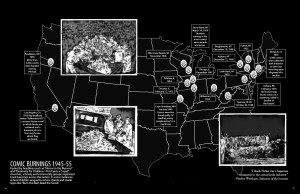(LONGER VERSION OF THE POST ON BOING BOING)
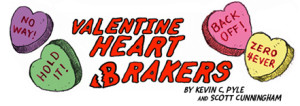
Birds sing. Flowers bloom. Hearts and cute animals. Stuff you see on vintage Valentine’s Day cards school kids once exchanged. But what would the cards look like if, instead of offering affection, they alerted children to the things about the holiday that could be BAD FOR YOU?
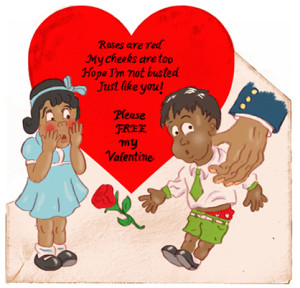
SAUDI ARABIA has a Committee for the Promotion of Virtue and the Prevention of Vice that hopes to clip any budding romance by prohibiting the sale of red roses on Valentine’s Day (though there’s a thriving black market for them). Selling anything shaped like a heart is also off-limits. Such conduct could lead young people “astray.” Or to jail: in 2012, they arrested 140 people for Feb 14th infringements.
Saudi Arabia isn’t the only country to crack down on Valentine’s Day. There’s a ban on the holiday in Iran, too. Malaysian officials have warned Muslims against celebrating; in Pakistan, TV and radio stations are encouraged not to broadcast anything too romantic. Last year, the day before Valentine’s, nearly 500 elementary school students in Surakarta, Central Java marched in protest against youths in their city who do celebrate the day. It ended at the stadium where the kids colored slips of paper (probably not red and probably not heart-shaped) to just say “no” to Valentine’s Day. Another Java mayor, this time in Pekanbaru, likewise said it was a no-no at the schools within his jurisdiction because of those “negative activities” associated with the day. Closer to home, the Tennessee Senate said “Yes-Yes” to update an abstinence-based sex education law redefining hand holding as a “gateway sexual activity” (and that’s not just on Valentine’s Day).

CANON CITY, COLORADO: Smooch a girl’s hand during music class and you can be accused of “sexual harassment” – even if you’re a first grader. According to the boy’s mother, the girl and her son were “crushes” at the time and it wasn’t the girl who complained – it was the class tattle-tails (but isn’t it always?). The public kiss-and-tell sent Mom to the principal’s office: “That was the day I had the meeting. . .where [the principal] first said ‘sexual harassment’” – words that are now stamped on the kid’s permanent record.
Seem a bit young? Well, during the 2005-06 school year, Maryland kindergartens were seemingly teeming with sex offenders: 28 suspensions that school year – 15 for sexual harassment. Take for example the five-year-old Lincolnshire Elementary student who pinched a classmate’s bottom. “He knows nothing about sex,” the kid’s father protested. But it doesn’t matter if a kid is too young to understand the meaning of sexual harassment. “[I]f it fits under the definition,” according to the Washington Country Schools spokeswoman, “then it is….”
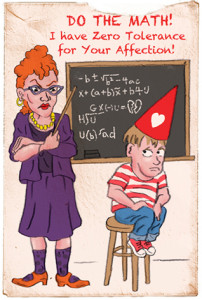
WACO, TEX: A four-year-old decided to give his teacher’s aide a hug while waiting for the bus outside La Vega Primary school. She decided that his face rubbed her chest. The school sided with the aide and then they decided to give the boy a preschool, in-school suspension for inappropriate sexual behavior. After his angry dad complained to the local news that it was a misinterpreted embrace, the school downgraded the boy’s hug to “inappropriate physical contact.”
Now if you think what the school did was “inappropriate” then maybe you haven’t heard of “Zero Tolerance.” The name was first used to describe federal anti-drug law enforcement policies in the 1980s which was designed to send a strong message to criminals by punishing both major and minor drug offences harshly. After a few years, schools decided to zero in on kids. By 1989, school districts in New York, California, and Kentucky had mandatory automatic expulsion for drugs, fighting, or violence. Eight years later, it was amended to cover anything that could be used as a weapon; soon, “Zero Tolerance” was expanded by local school districts to cover lots of things: from cell phones to physical contact – anything a school decides is “disruptive behavior.” Like hugging.
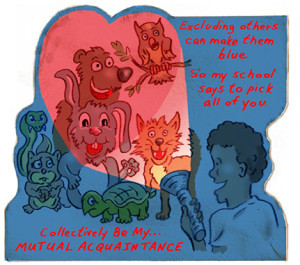
SALEMWOOD, MASS: On Feb. 14th, 2013, this elementary school didn’t exchange VD cards; instead, the kids swapped “Friendship cards.” Explaining that they didn’t want to offend any of the 67 different cultures found at the school, Principal Carol Keenan made sure “every single student” got a friendship card: “I didn’t want some students feeling left out.”
To make sure no one felt left out at Ashcombe Primary School in England, they left everyone out! The objective was to spare students the “emotional trauma” of rejection, so they rejected Valentine’s Day cards instead. The school believed that the children weren’t mature enough “emotionally and socially to understand the commitment involved in having or being a boyfriend or girlfriend.” Or the commitment involved in exchanging a greeting card either. In Calgary, Canada, they used an eco-friendly excuse to discard cards: “Imagine the trees we are saving by not exchanging cards in our school,” read a note sent home with the students. A note, one should note, that was written on paper. A student at James Madison Elementary School in Sheboygan, Wis. couldn’t deliver his holiday notes because of what was written on them: “Jesus Loves You” and “John 3:16.” School officials still allowed him to pass out his bags of candy hearts, but the religious references had to go. At least the kids got the candy (if not the message).
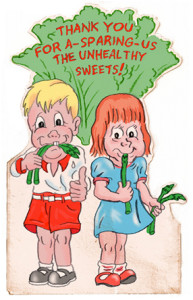
SAN DIEGO, CAL.: In 2007 Rancho Elementary decided that the school should encourage “healthier” Valentine choices. This left students with limited decoration options: adding “sequins, buttons, pipe cleaners and wiggly eyes. . .to pieces of fruit.” Under the circumstances, the kids tried their best, even penning cute phrases to accompany their – ahem – treats, including: “You’d make a grape Valentine!” and “Orange you glad it’s Valentine’s Day?”
At nearby Temecula Elementary, sweets were also in short supply. At Wednesday’s Valentine Brunch, kids had a choice of fruit, carrots, granola and nuts. Granola? But you know what’s worse? Valentine origami. That’s what the principal of Horace Mann School, Newton Mass. suggested the kids exchange after he implemented a candy bar em-bar-go at the school.
While it’s hard for a kid to truly “heart” a “heart-healthy” treat, no one is going to argue that too much candy isn’t bad for you. But what if too little of something is bad for you, too. In a recent study, scientists tracked the amount of high-fives, chest bumps and backslaps between NBA teammates; they found “that the more on-court touching there was early in the season, the more successful teams and individuals were by season’s end,” even after factoring in differences in players’ skill-level and salaries. Rick Chillot, who’s article, “The Power of Touch” in Psychology Today, surveyed recent touching studies, describes how “seemingly insignificant touches yield bigger tips for waitresses, that people shop and buy more if they’re touched by a store greeter, and that strang- ers are more likely to help someone if a touch accompanies the request.” “They just feel there’s a connection,” explains Laura Guerrero, coauthor of Close Encounters: Communication in Relationships. “They feel that they like that person more.”
Better put the brakes on that!
Special thanks to Phillip S. Pittz

